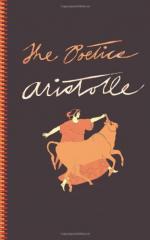|
This section contains 5,863 words (approx. 20 pages at 300 words per page) |

|
SOURCE: "The Tragic Action and Character," in Aristotle's Poetics, Rupert Hart-Davis, 1964, pp. 82-99.
In the following essay, written in 1956, House analyzes the features of dramatic characters which Aristotle discusses in Poetics. In particular, House focuses on the tragic hero and on the concept of hamartia, noting that the understanding ofhamartia as the hero's "tragic flaw" is misleading.
In the definition of Tragedy in ch. vi, Bywater's version makes Aristotle say that Tragedy is an imitation of an action that is "serious"; this is also Butcher's translation at that point. But in fact the Greek word here in the definition [spoudaīos] is the same as that used at the beginning of ch. ii (p. 25) in the sentence:
The objects the imitator represents are actions, with agents who are necessarily either good men [spoudaīos] or bad.
The word for the good men in ch. ii is the same...
|
This section contains 5,863 words (approx. 20 pages at 300 words per page) |

|


